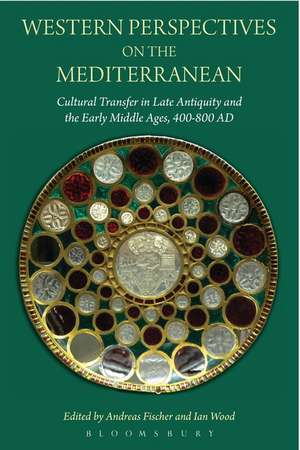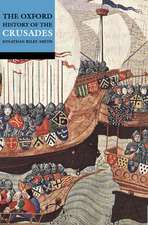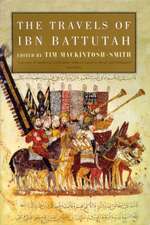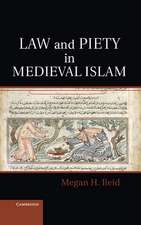Western Perspectives on the Mediterranean: Cultural Transfer in Late Antiquity and the Early Middle Ages, 400-800 AD
Editat de Andreas Fischer, Ian Wooden Limba Engleză Paperback – 27 mar 2016
| Toate formatele și edițiile | Preț | Express |
|---|---|---|
| Paperback (1) | 256.67 lei 43-57 zile | |
| Bloomsbury Publishing – 27 mar 2016 | 256.67 lei 43-57 zile | |
| Hardback (1) | 773.30 lei 43-57 zile | |
| Bloomsbury Publishing – 18 iun 2014 | 773.30 lei 43-57 zile |
Preț: 256.67 lei
Preț vechi: 330.74 lei
-22% Nou
Puncte Express: 385
Preț estimativ în valută:
49.11€ • 51.42$ • 40.64£
49.11€ • 51.42$ • 40.64£
Carte tipărită la comandă
Livrare economică 07-21 aprilie
Preluare comenzi: 021 569.72.76
Specificații
ISBN-13: 9781474269209
ISBN-10: 1474269206
Pagini: 224
Dimensiuni: 156 x 234 x 12 mm
Greutate: 0.32 kg
Ediția:NIPPOD
Editura: Bloomsbury Publishing
Colecția Bloomsbury Academic
Locul publicării:London, United Kingdom
ISBN-10: 1474269206
Pagini: 224
Dimensiuni: 156 x 234 x 12 mm
Greutate: 0.32 kg
Ediția:NIPPOD
Editura: Bloomsbury Publishing
Colecția Bloomsbury Academic
Locul publicării:London, United Kingdom
Caracteristici
Concentrates on a fascinating period of change in Europe, the aftermath of the fall of the Roman Empire
Notă biografică
Andreas Fischer is Wissenschaftlicher Mitarbeiter at the Friedrich-Meinecke-Institut, Freie Universität Berlin, Germany.Ian Wood is Professor of Early Medieval History at the University of Leeds, UK.
Cuprins
IntroductionThe Burgundians and ByzantiumIan Wood (School of History, University of Leeds, Uk)'Avenger of All Perjury' in Constantinople, Ravenna and Metz: St Polyeuctus, Sigibert I and the Division OfCharibert's Kingdom in 568 Stefan Esders (Friedrich-meinecke-institut, Freie Universität Berlin, Germany) The Historian as Cultural Broker in the Late and Post-roman West Helmut Reimitz (Department of History, Princeton University, USA)Rewriting History: Fredegar's Perspectives on the MediterraneanAndreas Fischer (Friedrich-meinecke-institut, Freie Universität Berlin, Germany)Greek Popes: Yes or No, and Did It Matter? Thomas Noble (Department of History, University of Notre Dame, USA)Mediterranean Lessons for Northumbrian Monks in Bede's Chronica Maiora Sören Kaschke (Seminar Für Mittelalterliche Geschichte, Eberhard Karls Universität Tübingen, Germany)Index
Recenzii
Collectively, these six essays reveal vividly that the communication routes of the early medieval Mediterranean carried not only commodities, objects of devotion, and travelers themselves, but intangible cultural products as well.
Readers who want to reconsider the Pirenne thesis will find much stimulating in ... the present volume. There are certainly many potentially interesting avenues for further investigation highlighted here.
It's hoped this carefully edited and stimulating volume will get international distribution. (Bloomsbury translation)
The overall quality of the volume is high, it is thematically coherent and the papers make original contributions to their specific topics.
By shifting attention from the western post-Roman kingdoms to the broader regions of the Mediterranean, the six engaging papers collected in this volume stoutly challenge received perceptions regarding the interaction and exchange of ideas between the East-Mediterranean world of Byzantium and the Barbarian West. This volume is both a welcome contribution to the burgeoning literature on the transformation of the Roman world, and a fresh thought-provoking re-evaluation of the Pirenne thesis.
Readers who want to reconsider the Pirenne thesis will find much stimulating in ... the present volume. There are certainly many potentially interesting avenues for further investigation highlighted here.
It's hoped this carefully edited and stimulating volume will get international distribution. (Bloomsbury translation)
The overall quality of the volume is high, it is thematically coherent and the papers make original contributions to their specific topics.
By shifting attention from the western post-Roman kingdoms to the broader regions of the Mediterranean, the six engaging papers collected in this volume stoutly challenge received perceptions regarding the interaction and exchange of ideas between the East-Mediterranean world of Byzantium and the Barbarian West. This volume is both a welcome contribution to the burgeoning literature on the transformation of the Roman world, and a fresh thought-provoking re-evaluation of the Pirenne thesis.
Descriere
A high-level scholarly collection of articles on the transmission of knowledge and culture from a Mediterranean world politically fragmented by the fall of the western Roman empire and Islamic expansion into Latin Europe, 400-800 AD.



















